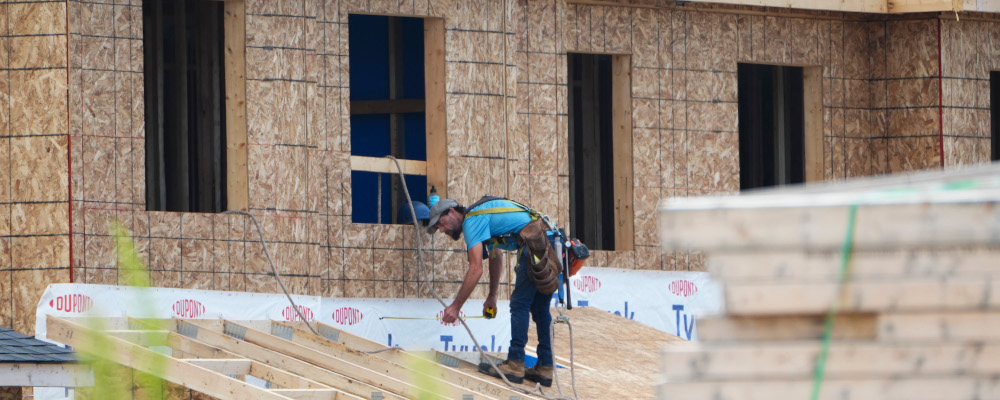As much debate as there is on demand-side solutions to the housing crisis, on the supply side, it’s pretty clear: we just need to build a lot more homes. If there was a good enough supply of homes for everyone who wanted one (to own or rent), housing would naturally be affordable.
But you can’t build 5.8 million homes in the next six years, as Canada Mortgage and Housing Corporation says we need to do, without adding infrastructure to service all those homes and those people.
Premiers and mayors alike have asked the federal government for more money to support this growing population. Specifically, Premier Doug Ford of Ontario has called on the federal government to provide more funding for transportation infrastructure, and the Federation of Canadian Municipalities has called on the federal government to establish a new dedicated water and wastewater fund, noting the lack of this infrastructure is slowing housing development.
The federal government should use this request as an opportunity to strengthen homebuilding incentives for municipalities by creating a fund that would pay municipalities for each housing start. Simply put: Ottawa’s policy response to municipalities’ calls for incremental infrastructure funding should come in the form of a fixed amount for new housing units.

There would be some who’d argue that direct federal funding to municipalities to influence their housing policies represents a case of federal overreach—it’s not the role or responsibility of the national government to dictate local land-use rules. But that constitutional debate has been effectively superseded by politics. Both the federal Liberals and Conservatives now include municipal incentives in their housing policies.
The Trudeau government’s Housing Accelerator Fund has driven substantial reforms at the municipal level in exchange for federal funding, including reducing red tape and allowing for more as-of-right construction. While provincial parties in Ontario debate the merits of allowing fourplexes as of right, the Accelerator requires it of larger cities. It has worked to change zoning rules in many cities, though some, such as Windsor, have refused to sign on, forgoing tens of millions of dollars of federal funding.
While these zoning reforms are helpful, they won’t do enough on their own. The Ontario and British Columbia governments, along with Pierre Poilievre through Bill C-356, have recognized that municipalities can always find creative ways to block new housing. Creating incentives based on actual results will stop that from happening. The federal Liberals would do well to take a page out of the Conservative playbooks of Poilievre and Ford and introduce outcome-based housing incentives to municipalities in addition to their incentives through the Housing Accelerator.
However, the Liberals should also recognize that both the Poilievre and Ford approaches suffer from some design flaws that should be addressed. The targets in each, particularly Poilievre’s Bill C-356, are arbitrary and will be trivially easy for some municipalities to hit and nearly impossible for others, limiting their effectiveness as incentives. As well, the incentives in Bill C-356 only apply to a handful of cities and leave out many cities with chronic housing shortages and growing unaffordability, such as Waterloo, Edmonton, Burlington, and most of the 905. Finally, in both approaches, it is difficult to estimate how much any one decision affects the amount of money a municipality will receive. Incentives only work if they are understood.
The federal government should design a new infrastructure funding system based on the best of the Poilievre and Ford approaches while correcting for their design flaws. The Federation of Canadian Municipalities has called on the federal government to provide an additional $2 billion per year in infrastructure funding in their Budget 2024 submission, which provides a target budget for the federal government to achieve with their new plan.

This is an opportunity for the federal government to create a program, inspired by one used in Australia, to require cities to sign on to the Housing Accelerator, along with other pro-housing policies of the federal government’s choosing, such as eliminating parking minimums, allowing homes from the design catalogue to be built as-of-right, and increased density on transit lines.
Any municipality that did so would receive a flat per-unit sum of $10,000 for every housing start. Given that Canada has 200,000 and 250,000 housing starts per year, and not every municipality would sign aboard, this $10,000 figure would keep the total budget at, or below, $2 billion. The $10,000 per housing start figure could be adjusted if the federal government was willing to put more (or less) money into the program.
This is a win-win plan, as it not only provides communities with the infrastructure they need to build more homes, but also creates easily understandable funding that does not rely on arbitrary targets. It would also potentially cover every community in Canada. It would also create a clear cost to the opposition of new housing construction.
When a city councillor suggests, say, removing 38 units from a project, housing-supply proponents would be able to point out the loss of $380,000 of federal funding such a move would cause. One of our hometowns of London is raising $70,000 for a new playground; it would be an incredibly powerful argument for local YIMBYs to point out that by council removing “just” seven units from a planning application, the city is losing the funding that could be used to fully fund the new kindergarten playground for John Dearness Public School.
We cannot meet our housing ambitions without more infrastructure. Let’s hope that in Budget 2024, the federal government recognizes the opportunity that it has been given with the municipalities’ funding request and creates a well-designed, outcomes-based infrastructure plan.
Recommended for You

Toronto, Montreal, Edmonton hit violent crime severity records, top-20 cities all see rises except Vancouver

‘We’re back in the haunted house’: Danielle Smith’s multi-billion-dollar deficit problem

Why neither Carney nor Poilievre is rushing towards a snap election

Canada’s great refugee disaster



